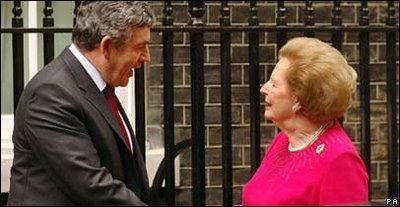Nice report, we'll take it!
 Be honest - did you really believe that David Cameron was in the slightest bit sincere about his quickly found love for green issues? Admittedly, in a world where you can be lectured on the environment by Joss Stone, who so profoundly informed us during Live Earth that all you have to do is replace your light bulbs, plant a tree and "it's done", it doesn't take much more knowledge than that to be taken seriously, and rightly mocking articles about Cameron's bike riding exploits with his documents following behind him in a car aside, his repositioning of the Tories over the issue has forced both of the other parties into taking the pressing danger of climate change far more seriously than they would have otherwise.
Be honest - did you really believe that David Cameron was in the slightest bit sincere about his quickly found love for green issues? Admittedly, in a world where you can be lectured on the environment by Joss Stone, who so profoundly informed us during Live Earth that all you have to do is replace your light bulbs, plant a tree and "it's done", it doesn't take much more knowledge than that to be taken seriously, and rightly mocking articles about Cameron's bike riding exploits with his documents following behind him in a car aside, his repositioning of the Tories over the issue has forced both of the other parties into taking the pressing danger of climate change far more seriously than they would have otherwise.Even so, it's still a shock that the Conservative party, of all parties, has put together such a well-thought out, reasonably radical highly credible action plan that isn't afraid to slay a few of the parties' sacred cows. True, it most likely doesn't go far enough: the Lib Dems have set the incredibly ambitious target of a zero-carbon Britain by 2050, but as yet their policies on achieving that are rudimentary to non-existent. The Tories' "Blueprint for a green economy" (PDF), chaired by John Gummer and Zac Goldsmith, is mostly made of proposals that can either be implemented almost immediately or within a matter of years. It's by far the most serious attempt by any political party other than the Greens themselves to address what is the most urgent issue we face.
Little surprise then that it's been welcomed by most of the Conservative party in the same way as they would a wind farm in their back garden. Mr Eugendies at least kept things succinct. Tory MEP Roger Helmer suggested that they had to pick between being "supply-side tax cutters" i.e. morons only interested in preserving the current status quo and only worrying when London is underwater, and "socio-environmental tinkerers and interventionists", i.e. crazies who want us all to exclusively eat a diet of lentils and fine beans. Brian Wilson, chairman of "Flying Matters", brought up the same spurious argument that putting VAT on an airline seat would penalise the families who only fly once a year while letting frequent fliers off free, as it's been shown that the huge expansion of low cost airlines has come not thanks to working families queuing up to fly but rather through those have always flown flying more often. Anything that is denounced by the "TaxPayers' Alliance", an organisation worthy of constant derision for the fact that it's run not in favour of "TaxPayers" but rather of the narrow interest of those who set it up in the first place masquerading as being represenatative of the huge cross-section of taxpayers ought to be worth supporting, and this certainly is.
For once, a Labour response to the document is actually worth repeating. Andy Burnham is quite right that this report and John Redwood's recent policy review are almost wholly incompatible; they're either going to have to do one or the other, or cherry pick from each. Cameron has supposedly pledged that "much" of that in today's report will be in the next Conservative manifesto, but we should believe that when we see it. To judge by the initial reaction, if anything's likely to further the revolt against Cameron, this document is likely to be it.
It's quite obvious therefore what the opposition parties ought to do if Cameron doesn't keep his word: steal it for themselves. The fact that Gordon Brown has spent the afternoon in a meeting with the milk snatcher herself, just by chance on the same day as Dave's released the report most likely to cause misgivings amongst the not so faithful, isn't exactly a positive sign, and it also shows how Brown's promise of an end to spin is worth about as much as those dossiers were. This week's patriotic, transparent garbage at the TUC from Brown was hardly the high point of his tenure so far either. Co-opting the Tories' best policy ideas in years if they fail to do so themselves might finally put some flesh on the otherwise bare bones of "change".
Labels: Blueprint for a green economy, climate change, David Cameron, Gordon Brown, Tories

